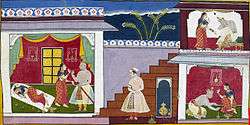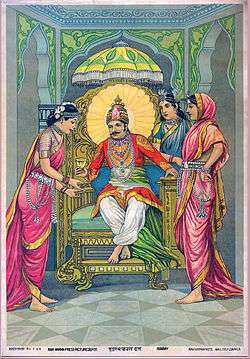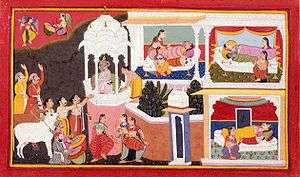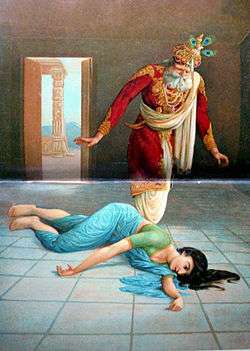Kaikeyi
| Kaikeyi | |
|---|---|
 Dasharatha promises to banish Rama per Kaikeyi's wishes(A folio from Ayodhya Kand manuscript) | |
| Information | |
| Spouse(s) | Dasharatha |
| Children | Bharata |
Kaikeyi (Sanskrit: कैकेयी, Kaikeyī, Indonesian: Kekayi, Burmese: Kaike, Malay: Kekayi, Thai: Kaiyakesi, in the Indian epic Ramayana, was one of King Dasharatha's three wives and Queen of Ayodhya. In Ayodhya kand Rama says that Kaikeyi is their younger mother(chapter 52, verse 61). But in Aranya kand Rama says that न ते अम्बा मध्यमा तात गर्हितव्या कथंचन। ताम् एव इक्ष्वाकु नाथस्य भरतस्य कथाम् कुरु(chapter 16, verse 37) Which means "In any way, dear Lakshmana, you are not supposed to deplore another mother of ours, but you go on telling the topics of Bharata, the king of Ikshvakus." The word अम्बा मध्यमा means second mother or middle mother. She was mother of Bharata. The term Kaikeyī in Sanskrit means belonging to Kekeya Kingdom, referring the ruling family of the Kekaya clan, to whom Kaikeyī belonged. Kaikeyi was daughter of king Ashwapati(lord of horses).
Early Life

As daughter of the mighty Ashwapati, a long-term ally of Kosala, Kaikeyi married Dasharatha, as his second wife. But after marriage, Kaikeyi was also not able to conceive a child, as Kashaulya. Dasharatha also married Sumitra, princess of Kashi, but she also remained barren for many years of marriage, as a result of which Dasharatha wasn't able to father a child.
As a young girl and only sister to seven brothers, Kaikeyi grew up without a maternal influence in her childhood home. Her father had banished her mother from Kekaya after realizing that his wife's nature was not conducive to a happy family life. Amongst other things, due to a boon, Ashwapati was able to understand the language of the birds. However, this was accompanied by a caveat that if he ever revealed the content of bird speak to anyone, even his own mother, that he would forthwith lose his life. One day, the King and his Queen were strolling through the palace gardens when Ashwapati happened to overhear the conversation of a pair of mated swans. The conversation so amused him that he laughed heartily, instigating his wife's curiosity. Despite being aware of the fact that Ashwapati could not divulge the content of the conversation to her without losing his life, Kaikeyi's mother insisted on knowing the cause of the King's mirth. When Ashwapati realized that his wife cared little for his life or well-being, he banished her to her parents' home.
Kaikeyi never saw her mother again. She was raised by her wet nurse, Manthara, who accompanied Kaikeyi to Ayodhya as a trusted maid upon her marriage to Dasharatha. The older woman schemed constantly to further her own position at the Court. And since her position depended on Kaikeyi's status at Court, Manthara lost no opportunity to feed young Kaikeyi's insecurity and jealousy of Kausalya, despite Dasharatha's obvious enchantment and love for all of his wives.
Manthara's scheming paid off when Kaikeyi was able to convince her husband to take her along with him during a military campaign against Sambarasura, an enemy of both Indra and Dasharatha. During a fierce battle between the two, the wheel of Dasharatha's chariot broke and Sambarasura's arrow pierced the King's armor and lodged in his chest. Kaikeyi, who was acting as Dasharatha's charioteer, quickly repaired the broken wheel and then drove the chariot away from the battle field. She nursed the wounded King back to health. Touched by her courage and timely service, Dasharatha offered her two boons. However, Kaikeyi chose to ask those boons later.
Boon


Years passed and all three Queens produced sons. Rama, son of Kaushalya, was Dasharatha's favourite son. During Rama's childhood, Kaikeyi loved to spend time with Rama and took care of him more than her own son. Rama was a loving, obedient child who followed his father's foot steps. When he turned 16, he married Sita, rumoured to be daughter of the Earth Goddess and foster-daughter of King Janaka of Mithila. Her son Bharata married Sita's cousin Mandavi. Her father Ashwapati fell ill and requested Bharata's presence. Kaikeyi's brother Yuddhajit notified Dasharatha of this and so sent Bharata with Yuddhajit. Shatrughna, who was close to Bharata since childhood, went with him.
Later, Dasharatha, with the approval of royal assembly, selected Rama to be crowned King. Kaikeyi was delighted and as happy as she would have been had it been her own son, Bharata's, coronation. However, Manthara, Kaikeyi's wet nurse, became worried that Kaikeyi would lose her status as Chief Queen at Court if Rama ascended the throne, as Kausalya would thus become Queen Mother. She decided to instigate trouble. She tried to fuel Kaikeyi's jealousy and envy of Kausalya by reminding her that her son's coronation would give Kausalya her former status as the most important of Dasharatha's Queens and would cut Bharata out of the royal lineage forever, but this didn't,t had effect on Kaikeyi. Manthara later convinced Kaikeyi to demand the two boons granted to her years earlier by Dasharatha.
After sending Rama into exile, a grief-stricken Dasharatha died of a broken heart six days after Rama left Ayodhya. She came to blame herself for this death. Furthermore, Bharata swore never to ascend the throne as it was his older brother's birth right. He further blamed her for his father's death and is said never to have addressed her as mother again. He also cursed her saying that no father shall here-on name his daughter as Kaikeyi. It is reported that this is the reason why the name Kaikeyi is often unheard of. Realising her mistake, Kaikeyi repented for sending her most beloved son away for 14 years.
After Rama's return, she apologized to him for her sins. Rama touched her feet and said there is no need to ask for forgiveness as he didn't feel bad about what happened, he insisted Bharata to forgive his mother. Rama also insisted to Bharata that what mothers do whether it is good or bad(defending Kaikeyi) is for betterment of their children, not for herself so it is not good to be angry and sour with them.
References
External links
| Wikimedia Commons has media related to Kaikeyi. |
.jpg)